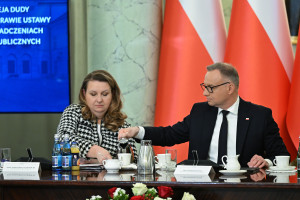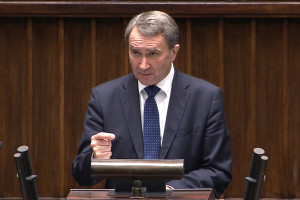National Health Fund Vice President: Let's Consider Whether Public Money Should Be Spent on Pay Schemes for Doctors

- The Vice President of the National Health Fund talks in an interview for Rynek Zdrowia about how it is to work on an unapproved financial plan
- Jakub Szulc believes that the best way to finance the National Health Fund is through health insurance contributions. Meanwhile, the Fund increasingly has to rely on external financing, i.e. subsidies from the state budget.
- - The problem is that the Minister of Health has to fight for the same limited funds, for example with the Minister of National Defense. And he will not necessarily always emerge victorious from this clash - he emphasizes
- He adds that the cost of implementing the minimum wage act in 2025 alone will amount to over PLN 50 billion.
- - It should be considered whether if we finance something from public funds, we should finance it without limits. I am talking about the highest salaries. If teachers, civil servants, uniformed services do not have their salaries released, should medical workers not also be subject to some regulation? - Szulc wonders.
- It also discusses how the National Health Fund settled its obligations towards hospitals in terms of overpayments.
- It also finally explains how much less money would flow into the National Health Fund if the reduction in health insurance contributions were to take place and what the Fund would be able to finance from these funds.
Agata Szczepańska, Beata Pieniążek-Osińska, Rynek Zdrowia: How to work on an unapproved financial plan?
Jakub Szulc, Vice President of the National Health Fund : The same as on the approved one. On the one hand, the plan is not approved by the Minister of Finance, but on the other - the act clearly and distinctly states what happens in such a situation. Then we work on the basis of the plan, which was drawn up after the project was reviewed by both parliamentary committees - health and finance and the Fund Council. So an unapproved plan is treated on the same basis as an approved one.
This means that we treat the purchasing plans prepared last year as valid and binding. And this is fully consistent with the letter and spirit of the regulations.
Similarly, the act also provides for how the general reserve is to be dissolved - after obtaining a positive opinion from the Minister of Finance and the Minister of Health. And so it happened. So the work of the National Health Fund is proceeding normally.
So how do you work on a budget plan without a reserve in the form of a reserve fund? This is something new, because up until now this fund has always been there.
What is new is not even the fact that there is PLN 0.5 billion in the reserve fund, and in previous years these were much higher amounts, but above all the fact that today's revenues from contributions do not enable us to cover health needs to the same extent as they were covered from contributions in previous years.
If we look at the Fund's finances from five or ten years ago, basically all of its current operations, and these are actually over 98% of the costs of health services, could be financed from contributions. Since the statutory changes that took place in 2022, i.e. the amendment to the Act on the Medical and Dental Professions, and the introduction of the obligation for the National Health Fund to finance tasks that were previously paid for directly by the state budget, and the amendment to the Act on the method of determining the minimum basic salary of certain employees employed in medical entities, the Fund has to rely much more on external financing, i.e. on budget subsidies. This is certainly a big difference compared to what we had before.
The Wage Act was introduced in 2017. Was it not such a big burden then?
The act was introduced in 2017 in a completely different form, because until 2020 the reference point was a fixed amount specified in the act. From 2021, this has changed and since then we have been indexing to the average salary for the previous year. Therefore, we have no influence on what funds must be allocated to implement the effects of this act. This is beyond our control. It depends on what the labor market looks like in the entire economy.
What next for the Wage Act? "Some action will have to be taken"If it weren’t for the Medical Profession Act and the changes to the Remuneration Act, would the National Health Fund still balance its accounts on contributions?
It seems so. If there were no such decisions, the National Health Fund would be able to buy everything it was established for from contributions alone. This can be calculated quite easily. The annual cost of implementing the act on the medical and dental professions is currently over PLN 10.9 billion. The annual cost of implementing the act on the minimum wage in 2025 alone will amount to over PLN 50 billion. So we have an amount of over PLN 60 billion from these two titles alone. This year's financial plan is approximately PLN 198 billion for benefits, including PLN 173 billion in contribution revenues. If it were not for these two acts, even in the absence of a budget subsidy (PLN 22 billion), we would have PLN 35 billion more in free funds at our disposal, which could be allocated to purchasing benefits.
So in theory it would be enough to undo these two changes?
In theory, everything is possible. However, this is not within the competence of the Fund and its bodies.
Let us ask differently: would the Fund like to see these changes reversed?
I have said many times that with such legal solutions we will need more and more funds to carry out our tasks without worsening access to benefits. The nature of the Minimum Wage Act is such that it works incrementally - it is a cost that accumulates from year to year, and the dynamics of these increases are greater than the dynamics of the contribution to the Fund. That is, if the Act was unbalanced at PLN 9 billion in 2022, then in 2025 it will be unbalanced at PLN 50 billion. So some action will definitely have to be taken here - whether it involves changing the pace of wage growth or entering the need to provide sources of financing directly into the Act.
However, we are not taking part in the discussion about whether it is good or bad that the minimum wage law works. It has definitely had one effect: we have finally stopped talking about wages in healthcare as a problem to be solved. Today, all people working in the healthcare system earn at least a decent wage.
But there is another thread. We should consider whether if we finance something from public funds, we should finance it without limits. I am talking about the highest salaries. If teachers, civil servants, uniformed services do not have their salaries released, should medical workers not also be subject to some regulation? Some intervention should definitely be introduced.
"I don't look into anyone's pockets, but..."Speaking of limits, a few months ago the slogan "Szulc's cap" appeared. In short: you had an idea for a hospital that wanted to sign a contract with a doctor for more than, say, PLN 80,000 to inform the National Health Fund. The President of the Supreme Medical Council, Łukasz Jankowski, told us that you had discussed such a solution and he seemed open to it. Maybe this proposal would have a chance of being implemented, since the medical self-government does not immediately say no?
It was just a casual conversation about what to do to limit publicly funded payroll scams. If the Supreme Medical Council and the NRL president himself think this is an idea worth considering, then so much the better.
If we are talking about public funds, I believe that we should define in terms of amounts the scope of these funds . I am not looking into anyone's pocket, but I believe that we should consider whether such exorbitant wages should be financed from public funds. We do not operate in a reality in which after paying for services we are left with a lot of money. We operate in a reality in which we still have unmet health needs and spending every złoty on one purpose means not spending that złoty somewhere else.
The problem with the Wage Act is also that in recent years we have been financing much more than it requires. How will it be this year? Will it be financed less generously in connection with the tight situation in the financial plan?
The Fund does not prepare a recommendation nor does it select a variant for implementation.
Of course, but the National Health Fund also has a say in this matter, at least in an advisory capacity.
I have already said somewhere that the increase bill is a "killer" for the finances of the National Health Fund. It is difficult to express my approach to this issue more clearly.
In general, I believe that introducing any solutions that generate additional costs without ensuring financing is associated with limiting access to benefits. If we are required to finance increases, and the funds for this do not come from outside, then these increases must be financed from contributions. The question arises whether the Fund should buy benefits or rather finance resources in health care? Over the years, the role of the Fund is becoming less and less that of a payer, and more and more the role of an organizer and institution financing the system's resources.
In some cases, of course, this is justified: for example, emergency medical services. Here, we know that something has to be paid for so that it can function. We pay for readiness.
This is also a reason to consider how it should look in the future. Because historically, when we moved from a budget system of financing health care to a contributory system, the assumption was that we would finance everything we wanted to buy from service providers with contributions. Over the years, this system has evolved and today we are at a point where we will definitely not buy everything we commit to with contributions. So we have to rely on external financing. And now the question is: is it going to stay like this or do we want to change something? After these twenty-something years of the NHF functioning, we should consider what role we foresee for the Fund: are we heading in the direction of, for example, the British NHS - an institution that, in addition to buying services, is also the owner of the system's resources: hospitals, clinics, etc. Or is it an external and relatively objective entity whose task is to buy as many services of the best quality as possible for a given price?
Settlements with hospitals - the decision to provide services beyond the limit means riskWell, that blanket is always too short, so it's hard not to ask, what do the settlements with hospitals look like? What did the National Health Fund pay for, and what will it pay for in full, as far as last year is concerned?
Unlimited benefits, medicines in drug and chemotherapy programs are financed at 100 percent of the value of performance for 2024. We financed these settlements on an ongoing basis, at the end of each quarter, and here, similarly to drug programs, the settlements were closed before the end of March. As for limited benefits, we accept for settlement all that have been properly reported, although not everywhere at 100 percent of the nominal value. On average, this will come out to a level slightly above 80 percent of the nominal value, depending on the "product mix", i.e. what services a given entity provides. Here, the settlements lasted until the end of April.
So the National Health Fund pays for everything, but not everything in full?
Yes. And this is consistent with how we have accounted for benefits in the past, but also consistent with what I have already mentioned: the pragmatism speaks for it, that not paying 100% here will allow you to buy more benefits in 2025, or pay for more benefits.
So is it true that some hospitals may be at a loss because they provide more services that will not be paid in full?
Let me remind you of one fundamental thing: we are talking about limited services. Making a decision to provide services above the value of the contract means that the service provider agrees to bear the risk of no settlement or incomplete settlement.
Isn't this a bit mutually exclusive? Because on the one hand, limiting payments for excess limits is supposed to result in greater availability of services in the following year, but on the other hand, hospitals may start to limit the number of services currently provided, knowing that they will not receive money for excess limits?
Here we have two important issues. Firstly, some of the costs incurred in each facility are fixed costs - independent of the performance or non-performance of another hospitalization: administrative and management costs, electricity, heating, media, some costs of medical personnel. This means that at a given scale of activity, the additional unit cost of hospitalization is primarily a variable cost - the use of degressive rates is therefore absolutely justified here - also due to the concern for the economy of spending public funds.
Secondly, not all services are equally important to the health and life of the patient. I am not saying that there is no medical need, because there is.
Are changes to your cart necessary?We just need to be aware that with public spending on health below 5.6 percent of GDP, we will have unmet health needs. It is impossible to finance unlimited needs with limited funds.
So maybe we should go back to the discussion about the fact that we have these unlimited needs, an unlimited basket of benefits and yet it needs to be redefined somehow?
I would be very careful here. If we were functioning in the Anglo-Saxon reality, such a discussion would probably be possible. If we look at how health is culturally and socially sanctioned in European systems, I do not think that there is room for discussion here. I do not think that we should limit the basket. Poles spend relatively much on health from private funds anyway. About 30% of funds in the system are private money, which puts us absolutely at the forefront, both in the European Union countries and among OECD countries. In a situation where we already spend relatively much on health from our own pockets, such a solution is difficult to accept and is not advisable.
We should rather think about how to rationally manage what we spend, with the health expenditures we have. That is why, among other things, we are currently rationalizing the regulations regarding specialist facilities, because we see that the huge money that has been allocated to these clinics has not contributed to shortening the queues. Unlimited outpatient specialist care was introduced in 2021, but after more than three years we see that this solution has not fully responded to the needs. The intervention turned out to be less effective than we would have liked, which is why we are introducing changes here.
It is also worth noting that the structure of benefits has changed a lot over the years. When the Fund was established, or when the health insurance funds were still operating, basically all benefits were limited. Today, apart from the flat-rate, i.e. apart from financing some benefits in hospital treatment, several dozen percent of benefits are unlimited benefits. These are all benefits for children under 18, all oncology financed on the basis of DILO, all imaging diagnostics, or the aforementioned AOS. So the cost structure is completely different than it was 10, 15 or 20 years ago. This means that costs increase from year to year regardless of the dynamics of funds in the Fund.
Changes in health insurance contributions - how much would the National Health Fund lose?There will be even less money in the system because the government is reducing the health insurance contribution for entrepreneurs. Some changes are already in force this year, others were to come into force next year. However, they will probably not come into force because the president vetoed the act. In the discussion on this topic, different amounts were mentioned in terms of the financial impact on the Fund - PLN 4.6 billion, PLN 5.8 billion. What loss for the National Health Fund will result from the changes this year, and what from the changes next year? What effect will this have on the already tight budget?
This year we have two changes in the contribution for entrepreneurs. One is a reduction in the basis for calculating the contribution from 100 percent of the minimum wage for entrepreneurs to 75 percent of the minimum wage, i.e. by one quarter. The financial impact is about a billion zlotys and will be visible only this year, because the act itself applies only to 2025.
The second solution, which has already been adopted, is the lack of calculating the health insurance contribution from the sale of fixed assets by entrepreneurs. Here, the effects are about PLN 500-600 million of permanent loss on the contribution, which will be repeated every year.
As for next year's changes, here - as you have noticed - they are talking about PLN 4.8 billion and about PLN 6 billion. Both amounts are true. The lower one concerns the effect on the public finance sector, and the higher one concerns the effect on the NFZ budget. The loss of the NFZ contribution when introducing this solution will be - at today's prices, with today's GDP, with today's economic activity - about PLN 6 billion per year, with a tendency for linear growth in subsequent years. The total effect on the public finance sector is estimated at PLN 4.8 billion. That is, PLN 1.2 billion less - for a very simple reason - a lower health contribution will translate into an increase in income from business activity, i.e. an increase in personal income tax.
To sum up, the changes in the premium that we already have are about PLN 1.5 billion in the loss of premium written in 2025 for the National Health Fund and about PLN 600 million in subsequent years. The change that was to come into effect next year is an annual loss of premium of about PLN 6 billion and is also a permanent part of the revenue structure of the National Health Fund.
In the discussion on this topic, there are voices that these 6 billion zlotys are actually not much in the scale of the entire NFZ budget. Is it a lot or a little? What can the Fund buy for this amount?
Indeed, from the perspective of the state budget or the financial plan of the National Health Fund, it seems that these are not dramatically large funds: 6 billion out of 200 billion is 3%. Is 3% of total funds a lot or a little? We can say that it is the sum of all overperformance for the last quarter of the previous year, or that it is one third of the annual expenditure on specialist outpatient care, or the entire, plus more, functioning of the emergency medical system.
What is important in my opinion is the fact that any loss of contribution revenue entails the need to supplement it with another stream of money, most often a budget subsidy. And the budget is not a bottomless bag that you can constantly reach into and always have something left. Especially since after years of fairly loose financial discipline, we have to start limiting what we have spent in a very often off-budget way, and in effect burdening the state budget, especially since 2020.
We also need to look at what has happened in recent years and what is also a threat to the National Health Fund. The fund previously received subsidies from the state budget as earmarked subsidies, i.e. for the implementation of a specific goal, e.g. to finance medicines for children and seniors. However, in 2022, the earmarked subsidy was replaced with an entity subsidy and now we have everything in one bag. A horse and a row to anyone who can find their way in all this.
I am surprised how often we talk about the fact that we should move beyond budget financing. Unfortunately, the problem here is that the Minister of Health has to fight for the same limited funds with the Minister of National Defense, with the Minister of Internal Affairs and Administration, with the Minister of Education, Sports, Culture, etc. And he will not necessarily always emerge victorious from this clash. Meanwhile, contribution financing means that we do not have to fight for money for health every year. This is the most stable stream of financing that one can imagine. From my perspective and from the perspective of the Fund as an organization, but also the health care system as a whole, the most reliable source of financing is the health contribution. No one has yet come up with a better source of financing for health care.
How would you vote on the contribution if you were now Deputy Minister of Health and a member of Parliament or senator?
Well, that's why I'm not.
Copyrighted material - reprint rules are specified in the regulations .
rynekzdrowia
















